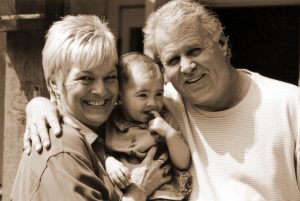Board Certified Family Law Specialist Matt Arnold answers the question: “What are my custody rights if the other parent moves?”
If you’re a grandparent interested in maintaining a close relationship with your grandchildren, divorce might seem like bad news. Unfortunately, when some couples divorce, the amount of time the grandchildren are able to spend with the grandparents drops. The former son or daughter-in-law may not have an interest in dividing his or her time with the ex’s parents, meaning the opportunity for visits gets cut in half. In cases where the grandparents are estranged from their own child, limited visitation might become nonexistent.
 This kind of nightmare scenario is what can lead some grandparents to consider drastic alternatives, including suing for visitation rights. Though we might think of visitation and custody as disputes occurring between parents, that is not always the case. In Pennsylvania, and many other states, grandparents are allowed to bring a claim for partial or, in particularly extreme cases, full custody of their grandchildren. Though many cases where grandparents sue for custody involve one or more parents who have been deemed unfit, that is not always the case. Grandparents have been known to sue and win partial custody in cases where there are two otherwise fit parents.
This kind of nightmare scenario is what can lead some grandparents to consider drastic alternatives, including suing for visitation rights. Though we might think of visitation and custody as disputes occurring between parents, that is not always the case. In Pennsylvania, and many other states, grandparents are allowed to bring a claim for partial or, in particularly extreme cases, full custody of their grandchildren. Though many cases where grandparents sue for custody involve one or more parents who have been deemed unfit, that is not always the case. Grandparents have been known to sue and win partial custody in cases where there are two otherwise fit parents.
This kind of case is what came before the Pennsylvania Supreme Court earlier this fall. In that case, D.P. and B.P. v. G.J.P and A.P., the Court had to wrestle with whether the state’s existing laws concerning grandparent custody should be upheld. The case involved a husband and wife who had separated, but never actually filed for divorce or started custody proceedings. Instead, the two agreed on their own about a parenting plan. Unfortunately for the grandparents, the husband and wife both agreed that the kids’ paternal grandparents would not be allowed contact.
This led the grandparents to sue for partial custody. In the filing, the grandparents did not claim that both parents were unfit, they instead said that the law, as written, allowed them to assert their claim for contact with the grand-kids. The law, found in Subsection 2 of Section 5325, says that “where parents of a child have been separated for a period of at least six months, or have commenced a proceeding to dissolve their marriage”, grandparents can claim for partial custody.
Unfortunately for the grandparents, the Court disagreed with their claim and ended up finding the law, or at least a portion of it, unconstitutional. According to the Court, the law improperly assumed that parents are unfit to raise a child simple because they are separated. The law should instead presume that parents are making the right decisions for their kids, unless there is evidence to the contrary. That means, parents should be given the freedom to deny visitation to grandparents should they believe this is truly in the child’s best interest.
The case was curious because the Court only declared a portion of the law unconstitutional. The Court limited its ruling to cases concerning separation for six months or more and chose to remain silent about claims from grandparents that occur in the midst of a divorce or custody proceeding. Whether that too is unconstitutional remains to be seen.
If you find yourself facing a complicated family law matter, then you need the help of experienced family-law attorneys in Charlotte, North Carolina who can help guide you through the often confusing process of divorce. Please contact Arnold & Smith, PLLC today at (704) 370-2828 or find additional resources here.
About the Author
 Matthew Arnold is a Managing Member of Arnold & Smith, PLLC, where he focuses on the areas of family law, divorce, child custody, child support, alimony and equitable distribution.
Matthew Arnold is a Managing Member of Arnold & Smith, PLLC, where he focuses on the areas of family law, divorce, child custody, child support, alimony and equitable distribution.
Mr. Arnold was raised in Charlotte, where he graduated from Providence Senior High School. He attended Belmont Abbey College, where he graduated cum laude, before attending law school at the University of North Carolina at Chapel Hill on a full academic scholarship.
A certified Family-Law Specialist, Mr. Arnold is admitted to practice in all state and administrative courts in North Carolina, before the United States District Court for the Western District of North Carolina, and before the Fourth Circuit Court of Appeals in Richmond, Virginia.
In his free time, Mr. Arnold enjoys golfing and spending time with his wife and three children.
Source:
Image Credit:
http://www.freeimages.com/photo/grandparents-1256161
See Our Related Video from our YouTube channel:
https://www.youtube.com/user/ArnoldSmithPLLC?feature=watch
See Our Related Blog Posts:
 Charlotte Divorce Lawyer Blog
Charlotte Divorce Lawyer Blog

